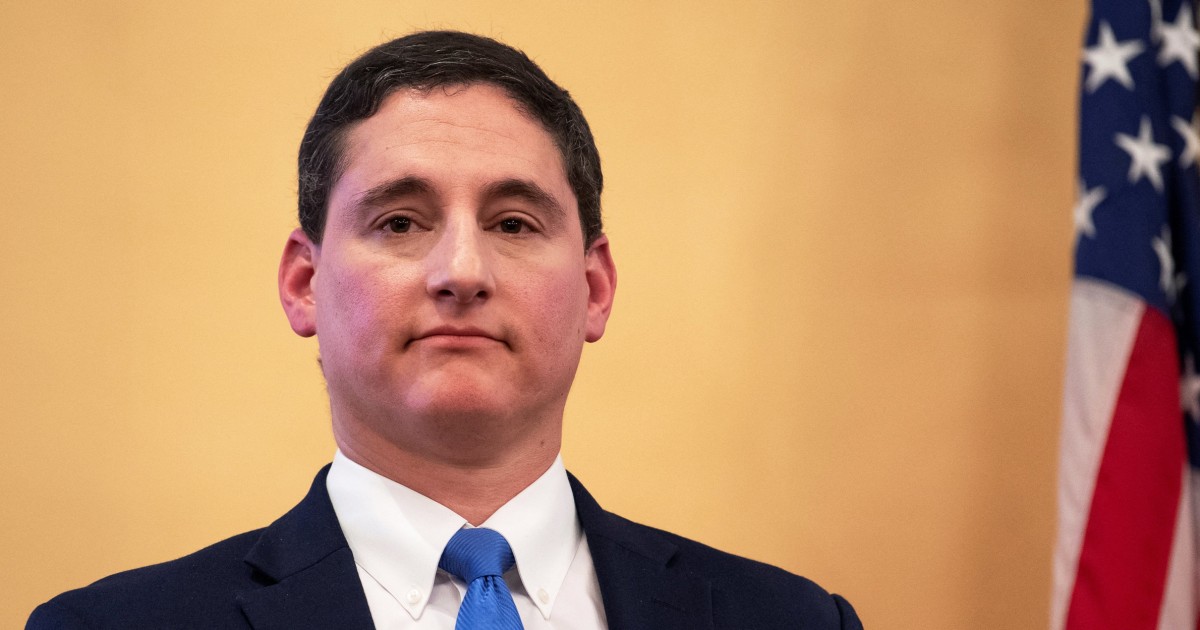
HUDSON, Ohio — On his way to winning the Ohio treasurer’s office in 2010, Josh Mandel aired a TV ad suggesting his opponent had ties to a mosque — a misleading attack quickly condemned for its anti-Muslim tone.
Mandel, then 33 and harboring ambitions of a long career in Republican politics, eventually apologized. But the tactics he employed then, and the right-wing identity he has been refining ever since, are now staples of a GOP led by former President Donald Trump. And they underpin Mandel’s third bid for a Senate seat in 10 years.
“Ilhan Omar should be deported not supported,” Mandel tweeted in June, referring to the Democratic congresswoman from Minnesota, a Somali-born Muslim.
The timing might finally be right for Mandel, who lost his first Senate race in 2012 and abruptly dropped out of a second campaign in 2018 citing a health issue with his then-wife. He echoes Trump’s grievances, fights the culture wars that energize the party’s base and indulges in racial stereotypes. In an Ohio primary that stands out nationally with so many candidates willing to say or do anything to win Trump’s endorsement, no candidate is saying or doing more than Mandel.
“There’s, like, 84 people running,” Mandel joked to an audience last month in this upscale suburb between Akron and Cleveland. “But there’s only one candidate that consistently says in every audience — whether it’s Hudson, Ohio, or Cincinnati, Ohio, or Toledo or Marietta — what I am about to say to you … that I believe the 2020 election was stolen from Donald J. Trump.”
Trump’s rise reflected and reinforced the politics that Mandel had been practicing in Ohio for years. Even so, Mandel can’t shake the criticism that he’s a shape-shifter, a charge that those who know him best say is oversimplified. In interviews with more than a dozen politicians, activists and operatives familiar with his career, a common observation dwelled on Mandel’s gift for self-promotion and his knack for identifying problems but his unwillingness to compromise.
His sincerity may be in question, but Mandel’s sense of where the GOP was headed — from a tea party movement steeped in fiscal conservatism to a personality-driven politics rooted in tribalism — proved correct. For more than a decade, he has ceded little room to his right.
“What you’re seeing is not a change in Josh,” said Jonathan Petrea, who managed his Ohio House campaigns in the 2000s. “It’s his reaction to the changing nature of politics.”
‘You should see the stuff that doesn’t get online’
Few trends reflect the altered landscape better than Twitter, which was less of a political weapon during Mandel’s first run for Senate. Today he uses it to serve up the kind of outrage that Trump reveled in before the social media platform banned him last year.
Mandel’s own account was briefly restricted last year after he tweeted stereotypes about Mexicans and Muslims. Nevertheless, he continues to tap out provocative material, whether he’s burning a Covid mask in a stairwell or comparing Afghan refugees to predatory “alligators.” In December, he nearly missed a flight home from New York after he detoured to a Cheesecake Factory restaurant in Queens, where he tweeted a video in support of a veteran who had recently been arrested after having protested the city’s Covid vaccination requirement for indoor dining.
In an interview last month after his speech in Hudson, Mandel flashed a mischievous grin when asked about his Twitter strategy.
“You should see the stuff that doesn’t get online,” he said with a laugh as he opened the text-messaging app on his iPhone to reveal a “Twitter approval thread” that the campaign uses to workshop his tweets.
Mandel was so proud of one recently rejected tweet — an attack on Rep. Alexandria Ocasio-Cortez, D-N.Y. — that he scrolled through the group chat until he found it, then held his phone up for display: “CO2 is not a pollutant but AOC is.”
His campaign manager, Scott Guthrie, had texted back a blunt ruling: “No.”
(After this article was published, Mandel tweeted it.)
Mandel launched his Senate campaign a year ago, soon after Republican incumbent Rob Portman announced he wouldn’t seek a third term. Mandel and his wife divorced in early 2020, and he had money left over from his 2018 campaign — a sore spot with activists who wished he had done more to help Jim Renacci, who replaced him on the ballot and was soundly defeated by Democratic Sen. Sherrod Brown.
A typical Mandel speech incorporates several biographical points of pride: his Jewish grandparents who survived the Holocaust, his military service, his scrapes with John Kasich, a former Ohio governor and a loud anti-Trumper.
Mandel relies on rhetorical straw men, bragging that he says the things that the media and “squishy RINOs” — Republicans In Name Only — don’t think he should: that the election was stolen from Trump, that mask and vaccination mandates are terrible, that there are only two genders. In Hudson, after having shared a lighthearted story about his kids, he whipped up anger against transgender people by wondering whether his 8-year-old daughter, a taekwondo student, might eventually have to compete against a “biological male.”
He also courts evangelical Christians, visiting churches and talking more about religion than he did in past campaigns. Mandel argues against the separation of church and state and pushes Judeo-Christian values, at times to Islamophobic effect. (A lesser-known Senate candidate made headlines after having aired a radio ad that called Mandel, who is Jewish, a “phony” for talking about the Bible.)
Most polling in the GOP primary has shown Mandel in the lead. But it hasn’t been the smoothest race. Several fundraising aides left the campaign last year, citing a toxic workplace created by Mandel’s finance director and girlfriend, Rachel Wilson, according to The Columbus Dispatch. A few months later, attempting to get ahead of a story that campaign officials feared might damage Mandel if it wasn’t tightly controlled, Wilson wrote a Toledo Blade guest column about a November 2020 miscarriage of the child she and Mandel were expecting.
And although Mandel is independently wealthy, he’s the only candidate in the primary who isn’t self-funding so far. Through this week, no other Republican in the race had spent less on ads. No one is sure who will strike first to define Mandel to voters — Mandel himself or one of his rivals.
“I think the reason why we’re still up double digits without spending any money on advertising is that over the years I’ve built this grassroots army of conservatives who know that I have the guts to take on Republicans when they’re acting like Democrats,” Mandel said last month.
A poll taken around that time by the Club for Growth, a conservative group that supports his candidacy, showed him in first place but with a smaller share of the vote than in previous surveys.
‘He seemed like a totally normal, regular Republican’
Ambition drove Mandel more than ideology early in his career, and establishment Republicans who saw in him a young and polite Jewish veteran who clicked with swing voters were eager to accommodate his quick rise.
After he graduated from Ohio State University, where he was a student government president, Mandel joined the Marines and served two tours in Iraq sandwiched between elections to the Lyndhurst City Council in Cleveland’s eastern suburbs and the Ohio House. His priorities back then tended to have a populist flair — a small property tax rebate in Lyndhurst and a push for state pension funds to divest from Iran, to name two examples — and attract publicity.
“He seemed like a totally normal, regular Republican,” said Matt Cox, a former Republican leader in Cuyahoga County who developed a close relationship with Mandel after he recruited him for campaign work.
On some issues, Mandel even seemed to be to the left of his party. Cox and others remember him privately expressing support for gay marriage before it was legal. He worried that the GOP was “on the wrong side of history” on the issue, said Cox, who is no longer close with Mandel and has donated to two of his 2022 rivals, Republican Matt Dolan and Rep. Tim Ryan, the front-runner for the Democratic nomination.
Guthrie, Mandel’s campaign manager, said the campaign considers Cox’s recollections to be “made up by a Never Trumper who seems to hate Josh due to Josh’s conservative values and support for Trump.”
Mandel’s shift to the right became more noticeable in 2010, the year he dabbled in religious bigotry while running for state treasurer. Cox, who at the time was managing a renewal campaign for a publicly funded economic development program, was counting on his friend’s endorsement. Mandel declined.
The 2012 Senate race further ratified Mandel’s transition. He voiced skepticism about climate change and railed against the auto industry bailout. He also found himself frequently tripped up by fact-checkers. Voters stuck with Brown, the Democratic incumbent.
“The level of vitriol that we saw from Josh in 2012, the willingness to get into the mud with false personal attacks and sort of a sociopathic-like ability to lie, even in the face of overwhelming evidence about any given issue, really foreshadowed the comfort in which Josh would slide into the darker elements of Donald Trump’s mold of the Republican Party,” said Justin Barasky, a longtime Brown adviser and Democratic media consultant who works with Ryan.
Mandel had his doubts about Trump in 2016, and he endorsed Sen. Marco Rubio, R-Fla., in the primaries. The move doubled as a snub of Kasich, then the governor.
A Republican who, like Mandel, was swept into statewide office on the 2010 tea party wave, Kasich eventually expanded Medicaid, pushed for a fracking tax and presented himself as a pragmatist in his own presidential campaign.
Mandel opposed Kasich each time, strengthening his credentials with the right.
“I mean, he was willing to fight battles where he could pay a very dear personal price for doing so,” said Lori Viars, a conservative activist from the Cincinnati area who is supporting Mandel. “He still did what was right.”
Others suspect Mandel was itching to stand out in a Republican-dominated state where establishment leaders like Kasich and Portman had built national brands.
“When you’re in a state with so many Republican elected officials, it’s hard not to fight amongst the party instead of Democrats, because there are not many Democrats,” said state Sen. Niraj Antani, a Republican who has remained neutral in this year’s Senate primary.
Today, Mandel boasts that he was the first statewide Republican officeholder to back Trump, citing as evidence the top staffers he sent to Trump’s Ohio team. And ahead of his expected rematch with Brown in 2018, Mandel defended right-wing conspiracy theorists Mike Cernovich and Jack Posobiec against criticism from the Anti-Defamation League. For him, it was another move to stay current with the Trumpian times. For others, it was a final straw.
“I called him up and said, ‘Look, I’m done,’” Cox recalled. “I was speaking on behalf of all of our friends who had spent the last 15, 18 years with him. I said, ‘You’re unrecognizable now from who you were when we first met and when you were first in politics.’ Then a couple months later, he dropped out. Then he disappeared, only to come back and be an even worse version of what he was.”
Whether all of that is enough for a Trump endorsement, Mandel isn’t sure.
“I’m doing everything I can to earn his support,” he said last month.
The former president weighs loyalty and the likelihood of winning when he decides whom to endorse. In Mandel, he would have the front-runner in the polls and the candidate most deeply committed to his debunked claims that the 2020 election was stolen. But Trump isn’t yet sold.
He has expressed concerns about how Mandel dropped out of the 2018 Senate race. And although Mandel raised $500,000 for Trump’s re-election bid, veterans of the 2016 and 2020 campaigns described Mandel’s public involvement as minimal.
“He’s someone who shows up for pictures and to steal donors,” said an adviser to the 2020 Trump Victory Finance Committee, who requested anonymity to speak candidly while recalling the time last year when Mandel attempted to crash a Republican National Committee donor retreat without an invitation.
“Josh’s calculation,” the adviser added in a remark that reflects the feelings of some in Trump’s world, “has always been about Josh.”
Source: | This article originally belongs to Nbcnews.com










